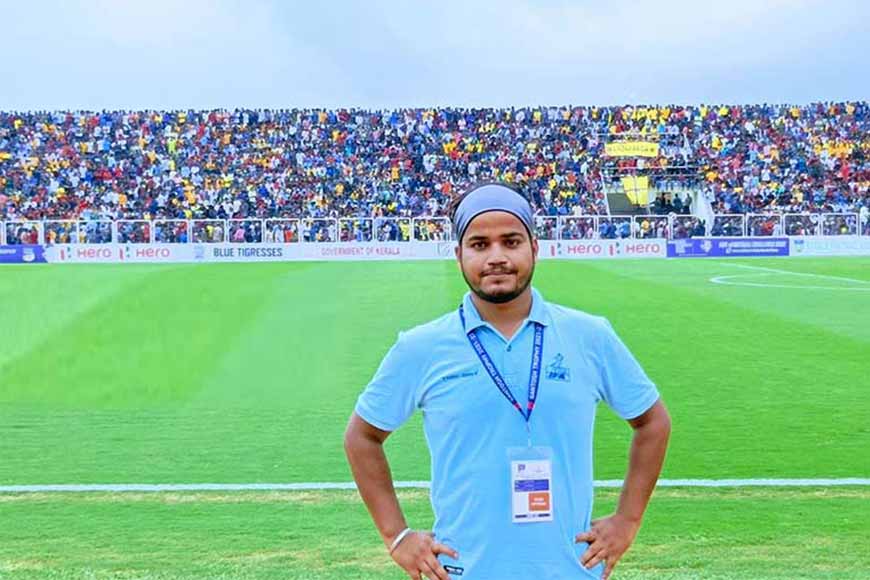Incredible story of grit and courage: Football manager Rahul Sheikh creates history

In the recently concluded 36thNational Games held at Gujarat, West Bengal thrashed Kerala 5-0 to emerge champion in men’s football. Winning the coveted Gold for the state was no mean feat for the hand-picked, young, motivated squad. Ever since the win, congratulatory messages and encouraging words have been pouring in from different parts of the country. The media is raving about the brilliant display of outstanding football on the field and going ga-ga over Rahul Sheikh, the manager of the winning Bengal team. He is the new kid on the block and his sensational leadership qualities have brought him to the forefront of the sports fraternity.
In sports like football, the team plays on the field and gets credit but the hard work put by the managers of the team often goes unnoticed. The managers are the ones who put the best talent together and decide the formation of the team and then let the players decide how they want to perform on the field. Over the years, the role of football manager has changed. A manager is responsible for running and functioning of the team now. He has the autonomy to choose the supporting staff. He also manages player’s contracts and can add more players if required.
Tracing the phenomenal rise of Rahul Sheikh, the current football manager of the state team, is like the stuff found in folktales. The boy who was born amid utter penury in an insignificant village in North Bengal traversed a long and significant path of his life within a short span to reach where he is now today. His indomitable spirit and his determination to take up all challenges and strive for victory have boosted his morale to move on and then Lady Luck extended a helping hand and success was his. Rahul, the son of a poor daily wage earner who did not have enough money to send his son to school for further education after Class V, has succeeded and reached a height that few in his circumstances can ever imagine.
Kolkata's iconic Salt Lake Yuba Bharati Stadium looked grand and all set to host the India vs Hong Kong Asian Cup Qualifier football match on June 14, 2022. As the match kicked off at 8.30 pm, the deafening sound of spectators shouting “India, India” reverberated off the stadium. The familiar face of Rahul Sheikh stood on the sidelines intently watching the players as the match progressed. Suddenly, heavy rain started to pour down in the middle of the match. The sponsors' perimeter boards were being dislocated due to the torrential rains and Rahul, who was drenched to the bones, struggled incessantly amid the rainstorm to reinstate the boards. This is Rahul Sheikh and his love and commitment for Bengal’s football.

India, who had already had their 2023 AFC Asian Cup berth booked, ended their qualifying campaign with a comprehensive 4-0 win over Hong Kong. A goal each by Anwar Ali, Sunil Chhetri, Manvir Singh and Ishan Pandita helped India end their campaign on a high. Rahul’s managerial skills had paid rich dividends and his team had accomplished the mission.
Barashimul is a rural area in Raghunathganj -II Block of Murshidabad district. A number of tiny settlements dot the Barashimul Dam, bordering Bangladesh on the banks of the Padma River. The border Security Force (BSF) have permanent outposts in the area. Rahul Sheikh was born in one of these nameless settlements. He studied at the local government primary school. He was an intelligent child and a good student, and his teachers were very fond of him. When most other children his age created a ruckus at the very prospect of attending classes, Rahul looked forward to going to school every day. He cleared his primary school examination with flying colours and it was now time for him to join secondary school. He was very excited when he was admitted to Class V, but his joy was short-lived. After a couple of months, he was forced to discontinue his studies because his mother could not afford the cost of sending him to school. Acute financial crunch compelled her to send Rahul to work as a masons’ assistant in distant lands.
It was around 2007, when Rahul was barely 11 years old, he left for Purulia with a team of masons to work as a helping hand. He had to give up his carefree childhood days and embrace the life of a child worker. His struggle had started much earlier though when he was still living with his mother in the village. Every day he would rush to the sprawling mango gardens in the locality with a sack on his back and collect dry leaves and twigs and fetch them home for using as fuel. Only after he brought home his collection, his mother could cook.
Jute seeds are planted between April and May and harvested between July and August. During the harvesting season, which is an intensely labour-oriented job, Rahul worked in the fields with adults and earned anything between Rs 30 and 40 per day. He would be hired to reap vegetables in the fields and at the day’s end would be given a cabbage, some spinach, a few brinjals or may be a cauliflower or two in lieu of his day-long labour.
(To be continued)










